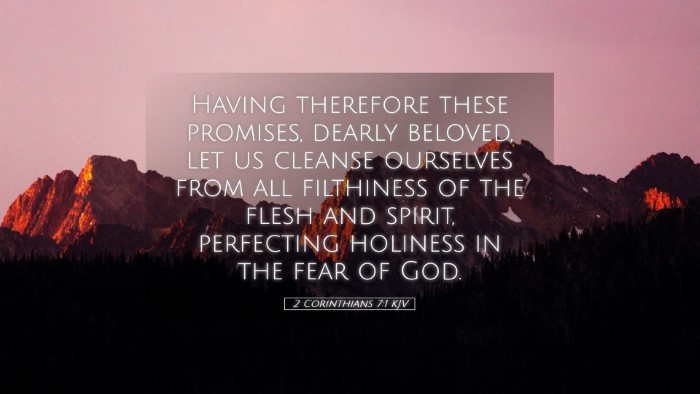Commentary on 2 Corinthians 7:1
“Having therefore these promises, dearly beloved, let us cleanse ourselves from all filthiness of the flesh and spirit, perfecting holiness in the fear of God.”
Introduction
This verse serves as a pivotal instruction in the Apostle Paul's appeal to the Corinthians, inviting them to live out the implications of the promises of God. The convergence of divine promise and ethical obligation is crucial in understanding the Christian life. Let us delve into the insights provided by notable public domain commentators, including Matthew Henry, Albert Barnes, and Adam Clarke, to unravel the rich theological and moral applications of this scripture.
Contextual Background
Understanding 2 Corinthians 7:1 requires an exploration of its broader context. This epistle reflects Paul’s deep pastoral concern for the church in Corinth, addressing issues of sin, reconciliation, and the transformative power of God's grace. The chapter begins with the exhortation “Having therefore these promises,” which refers back to the preceding verses that highlight the promises of God regarding His presence and favor to His people.
Matthew Henry’s Insights
Matthew Henry emphasizes the significance of the promises made to believers, suggesting that these assurances provide the foundation for holy living. He notes, “The promises of God are made to us in Christ, in His Gospel, and they are the ground of our expectation of good from Him.” This understanding positions the call to sanctification as a response to the grace received through these promises.
Albert Barnes’ Exposition
Albert Barnes elaborates on the need for self-cleansing, highlighting that the terms "filthiness of the flesh and spirit" encompass both moral and spiritual defilement. He states, “The apostle calls on them to cleanse themselves from all pollution—pure from all the evils that affect body and soul.” This dual aspect of cleansing serves to remind believers that sanctification affects every part of their being.
Adam Clarke’s Commentary
Adam Clarke contextualizes the phrase “perfecting holiness” as a continual process of growth in godliness. He argues that true holiness is not simply an abstract concept but a practical reality requiring vigilance and effort. Clarke points out, “Holiness is the ultimate goal of the Christian's life, and it is perfected in the reverent fear of God.” This insight challenges believers to pursue holiness actively and consistently.
Theological Implications
The theological implications of this verse are profound, primarily revolving around the themes of grace, responsibility, and the divine-human relationship. As highlighted by various commentators:
- Grace as Motivation: The promises of God act as a motivating force for believers to strive for purity and holiness, as indicated by Henry and Barnes.
- Holistic Cleansing: The notion that cleansing must take place in both the flesh and spirit underscores the comprehensive nature of sin and the necessity of a whole-hearted response in sanctification.
- Fear of God: The fear of God is portrayed as the necessary attitude in perfecting holiness, serving as a safeguard against complacency and the temptation to neglect one's spiritual health.
Practical Applications
In light of this rich theological context, several practical applications emerge for pastors, students, theologians, and scholars:
- Encouragement to Pursue Holiness: Leaders should encourage their congregations to recognize the paved path towards holiness and to embrace the journey of sanctification in response to God's promises.
- Teaching on Moral Purity: It is essential to impart teachings that advocate for moral purity while addressing both physical and spiritual dimensions of life.
- Discipleship in Fear of God: Discipleship programs should include discussions around the reverential fear of God, fostering an understanding of His holiness and our response to it.
Conclusion
2 Corinthians 7:1 serves as a clarion call for all believers to act in accordance with the grace bestowed upon them. By combining the insights of Matthew Henry, Albert Barnes, and Adam Clarke, we see how this verse invites us into a transformative relationship with God, characterized by a commitment to holiness and an understanding of His promises. May we all heed this exhortation to cleanse ourselves and perfect holiness, rooted in a healthy fear of the Lord.


